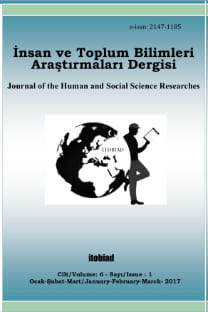KOBİ’lerin Finansal Sorunları Üzerine Bir Araştırma: Kars İli Örneği
Bu araştırmanın amacı, Kars merkezde faaliyet gösteren KOBİ’lerin en önemli sorunlarından biri olan finansman sorunlarını tespit etmek ve elde edilen sonuçlar doğrultusunda çözüm önerileri sunmaktır. Araştırmanın amacına uygun olarak Kars ilinde faaliyet gösteren 340 adet KOBİ’den elde edilen anket verileri Frekans Analizi, Anova Testi ve T-Testi ile analiz edilmiştir. Analiz sonucunda KOBİ’lerin finansman sorunlarının; mal ve hizmet fiyatlarının sürekli artması, piyasadaki nakit sıkıntısı, yüksek faiz oranları, yüksek döviz kuru, yüksek teminatlar, zorlu prosedürler, yetersiz öz sermaye ve kredi vade sayısının azlığı olarak tespit edilmiştir. Bunlara ek olarak kredi miktarının azlığı, alacakların tahsilindeki gecikmeler, kredi çeşitliliğinin azlığı, yüksek işçi maliyetleri, stokları geç tüketilmesi, yüksek kira maliyeti ve pazarlama faaliyetlerinin eksikliği tespit edilen finansal sorunlar arasında yer almaktadır.
Anahtar Kelimeler:
KOBİ, Finansal Sorunlar, Frekans Analizi, Anova Testi, T-Testi, Kars
A Study on The Financial Problems of SMEs: The Case of Kars
The aim of the study is to determine the financial problems, which are one of the most important problems of SMEs operating in Kars center, and to offer solutions according to the results obtained. In accordance with the purpose of the research, the questionnaire data obtained from 340 SMEs operating in Kars were analyzed by Frequency Analysis, Anova Test and T-Test. As a result of the analysis, the financial problems of SMEs were determined to be the constant increase in the prices of goods and services, the shortage of cash in the market, high interest rates, high exchange rates, high collaterals, difficult procedures, insufficient equity and scarcity in the number of credit terms. In addition to these, the shortage of credit amount, delays in debt collections, scarcity of credit diversity, high labor costs, late consumption of stocks, high rental costs and lack of marketing activities were among the identified financial problems.
Keywords:
SME, Financial Problems, Frequency Analysis, Anova Test, T-Test, Kars,
___
- Abraham, F. and Schmukler, S.L. (2017). Addressing The SME Finance Problem, Research and Policy Briefs, 9.
- Akgemci, T. (2001). KOBİ’lerin Temel Sorunları ve Sağlanan Destekler. Ankara: Kosgeb Yayını.
- Atay, S. (2012). KOBİ’lerin Türkiye'de Bankalarla Yaşadığı Finansal Sorunlar Ve Çözüm Önerileri, Finansal Araştırmalar ve Çalışmalar Dergisi, 3(6), 1-7.
- Canare, T., Francisco, J.P. ve Price, N.A. (2017). An Empirical Analysis of SME and Large Business Linkages: Evidence from the Philippines, Asian Institute of Management R.S. Navarro Policy Center for Competitiveness Working Paper 2017-008, 1-30.
- Chowdhury, M.S.A., Azam, M.K.G. and Islam, S. (2013). Problems and Prospects of SME Financing in Bangladesh, Asian Business Review, 2, (4), 51-58.
- Çabuk, A., Saygılı, A.T. (2003). Finansman Maliyetlerinin KOBİ’lerde Rekabet Gücü Üzerine Etkisi: Ampirik Bir Uygulama, Ulusal Finans Sempozyumu Bildirileri, İstanbul, 22-25.
- Demir, Ö., Aydın, D. ve Sezgin, E.E. (2019). Kobi’lerin Finansal Sorunlarının İncelenmesinde Dış Kaynağın Rolü: Diyarbakır İli Örneği, Anemon Muş Alparslan Üniversitesi Sosyal Bilimler Dergisi, 7(2) 225–233.
- Durmuş, B., Yurtkoru, E. S. ve Çinko, M. (2016). Sosyal Bilimlerde SPSS’le Veri Analizi. İstanbul: Beta Basım Yayım Dağıtım.Flynn, A. (2017). Re-thinking SME disadvantage in public procurement, Journal of Small Business and Enterprise Development, 24(4), 991-1008.
- Gall, F.L. ve Prager, M. (2011). Participation of SMEs in Standardization, Standart for Buiness ETSI White Paper, 6 , 1-17.
- Kaya, S. ve Alpkan, L. (2012). Problems and Solution Proposals for SMEs in Turkey, Emerging Markets Journal, 2, 30-45.
- Machmud, Z. and Huda, A. (2011). SMEs Access to Finance: An Indonesia Case Study’, in Selected East Asian Economies’, in Harvie, C., S. Oum, and D. Narjoko (eds.), Small and Medium Enterprises (SMEs) Access to Finance in Selected East Asian Economies. ERIA Research Project Report 2010-14, Jakarta: ERIA. 261-290.
- Olawale, F. ve Garwe, D. (2010). Obstacles to The Growth of New SMEs in South Africa: A Principal Component Analysis Approach. African Journal of Business Management, 4(5), 729-738.
- Ruzzier, M.K., Ruzzier, M. ve Hisrich, R.D. (2015). Marketing for Entrepreneurs and SMEs: A Global Perspective, Edward Elgar Pub, USA.Torlak, Ö. ve Uçkun, N. (2005). Eskişehir’deki KOBİ’lerin Pazarlama ve Finansman Sorunları Ara Kesiti, Sosyal Bilimler Dergisi, 1, 199-215.
- Uludağ, İ. ve Serin, V. (1991). Türkiye’de Küçük ve Orta Ölçekli İşletmeler: Yapısal ve Finansal Sorunlar, Çözümler, İstanbul Ticaret Odası, Yayın No:25.
- Wang, Y. (2016). What Are The Biggest Obstacles to Growth of SMEs in Developing Countries? An Empirical Evidence from an Enterprise Survey, Borsa Istanbul Review 16-3, 167-176.
- Wuest, T ve Thoben, K.D. (2011). Information Management for Manufacturing SMEs, IFIP Advances in Information and Communication Technology 384:481 – 488
- Xuhui, Y. ve Ruoxi, Z. (2013). Discussion on SME Financial Management Problems and Countermeasures, International Conference on Artificial Intelligence and Software Engineering (ICAISE), 107-112.
- Yang, Y., Chen, X., Gu, J. ve Fujita, H. (2019. Alleviating Financing Constraints of SMEs through Supply Chain, Sustainability, 11, 673.
- Yıldırım, D. Ç., Tosuner Ünal, Ö. ve Gedikli, A. (2015). Financial Problems of Small and Medium-Sized Enterprises in Turkey, International Journal of Academic Research in Business and Social Sciences, 5(1), 27-37.
- Yılmaz, H. (2007). Turizm Sektörü KOBİ’lerinin Finansman Sorunlarının Diğer Sektörlerle Karşılaştırmalı Analizi: Bodrum Örneği, Muhasebe ve Finansman Dergisi, 33, 162-170.
- Yörük, N. (2001). KOBİ’lerin Kredi Yoluyla Finansmanında Karşılaştıkları Sorunlar ve Tokat İlinde Bir Uygulama, I. Orta Anadolu Kongresi, Nevşehir, 59-72.
- ISSN: 2147-1185
- Yayın Aralığı: Yılda 4 Sayı
- Başlangıç: 2012
- Yayıncı: Mustafa SÜLEYMAN ÖZCAN
Sayıdaki Diğer Makaleler
EMRAH BİLGENER, MUHAMMET ÇANKAYA
Selçuklulara Başkaldıran İlk Halife: Müsterşid Billah (512- 529/1118-1135)
Çalışanların Psikolojik Sözleşmeye İlişkin Algıları ve Yenilikçi İş Davranışı ile İlişkisi
KOBİ’lerin Finansal Sorunları Üzerine Bir Araştırma: Kars İli Örneği
CEYDA YERDELEN KAYGIN, TUNCER YILMAZ
Kayırmacılık Kavramının İslam Ekonomisi Bağlamında İncelenmesi
SERKAN DİLEK, Recep ÖZDİREK, HAYRETTİN KESGİNGÖZ
Suçun Sosyo-ekonomik Belirleyicileri: Panel Veri Analizi
